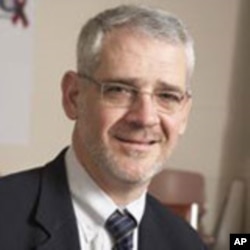The Chair of the 18th International AIDS Conference in Vienna says the gathering is both an important health and political summit. Dr. Julio Montaner, President of the International AIDS Society, says the conference remains relevant 30 years into the epidemic.
“I think… the fact that we continue to attract the kind of numbers that we are attracting provides the answer to your question,” he says. About 25,000 people are expected to attend, including some 2,000 journalists.
From a personal perspective, Montaner says, “This is the single most important public health conference ever held year after year, but you know we hold it every second year. We bring together not just medical science, basic science, but we are actually bringing every discipline. That includes anything from politicians to social scientists to community activists to persons affected with HIV and, of course, the more traditional medical groups.”
It really should be regarded, he says, as an “AIDS summit taking place, where we really take the opportunity to assess where we are at and what the next steps should be.”
Taking a stand
The conference takes strong positions on a number of issues. The theme is Rights Here, Right Now. Prior to the opening, AIDS 2010 released the Vienna Declaration, which called for a dramatic revaluation of international drug policies and the decriminalization of drug abusers. It says the matter should be a health issue, similar to the way alcoholism is now regarded. The declaration does not say countries should not try to control the flow of drugs. But Montaner says jailing drug abusers only helps to drive the epidemic underground, far from medical help.
He sees AIDS 2010 as a political summit, as well as a medical one.
“Of course, there is absolutely no doubt. AIDS has a very fundamental political dimension. If we had the political will, we could today face a very different perspective regarding the control of HIV worldwide. Pledges have been made. Pledges have been broken. Promises have been made and not fulfilled,” he says.
Dr. Montaner adds, “We are wasting effort, money, time, [and] lives because we are just not doing the right things. And we’re not doing the right things because the evidence is not there…. We’re doing something else, because the ideology is trampling evidence.”
In 2005, at the G8 summit in Gleneagles, Scotland, leaders pledged universal access to HIV care, treatment and prevention by 2010. That goal has not been fully achieved.
“The biggest theme that has been emerging from this conference, that actually is a unifying theme bringing everything together, is the fact that today, we are [in] 2010, the G8 pledge…[has] basically not been fulfilled. We are probably 40 percent there, if we are lucky,” he says.
Since 2005, people on HIV treatment have jumped from very low numbers in developing nations to over 5 million. “But we’re still at least in need of another 5 or 10 million people in treatment if we’re going to make a significant dent to the epidemic,” he says.
But there’s a global economic crisis
“The world is telling us, well, the resources are limited. And we’re telling them, you know what, it’s not a matter of resources, it’s a matter of priorities,” he says.
Montaner, who’s also director of the BC Center for Excellence in HIV/AIDS in Vancouver, Canada, says the U.S. and other rich nations were quick to help Wall Street, banks and carmakers deal with the economic downturn, even though problems in those areas contributed to the turmoil.
“You didn’t have any difficulty finding the millions and billions that were necessary to do that. Today, we’re saying invest in antiretroviral therapy for two reasons. First, it’s ethically, medically and morally the right thing to do. Secondly, it’s going to cost you a lot more later,” he says.
AIDS 2010 runs from July 18 through the 23rd.













